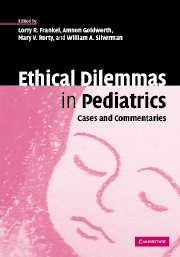Book contents
- Frontmatter
- Contents
- List of contributors
- Preface
- Introduction
- Part I Therapeutic misalliances
- Part II Medical futility
- Part III Life by any means
- 7.1 Where should a child die?
- 7.2 Where should a child (in the USA) die?
- 7.3 Topical discussion
- 8.1 Infant heart transplantation and hypoplastic left heart syndrome: what are the ethical issues?
- 8.2 Infant heart transplantation and hypoplastic left heart syndrome: a response
- 8.3 Topical discussion
- 9.1 Liver and intestinal transplantation
- 9.2 Transplantation and adolescents
- 9.3 Topical discussion
- Part IV Institutional impediments to ethical action
- References
- Index
- References
8.3 - Topical discussion
Published online by Cambridge University Press: 18 August 2009
- Frontmatter
- Contents
- List of contributors
- Preface
- Introduction
- Part I Therapeutic misalliances
- Part II Medical futility
- Part III Life by any means
- 7.1 Where should a child die?
- 7.2 Where should a child (in the USA) die?
- 7.3 Topical discussion
- 8.1 Infant heart transplantation and hypoplastic left heart syndrome: what are the ethical issues?
- 8.2 Infant heart transplantation and hypoplastic left heart syndrome: a response
- 8.3 Topical discussion
- 9.1 Liver and intestinal transplantation
- 9.2 Transplantation and adolescents
- 9.3 Topical discussion
- Part IV Institutional impediments to ethical action
- References
- Index
- References
Summary
Transplantation
Like the child in Dr. Burne's case (Chapter 7), the infant in Dr. Chin's case suffered from hypoplastic left heart syndrome. The main indication for cardiac transplantation in children under one year of age is congenital heart disease in more than 75% of those infants, and hypoplastic heart is at the top of the list. Overall survival in the pediatric age group after five years is approximately 65%; however, patients receiving transplants at younger than one year of age have a slightly lower survival rate (62%).
Some ethical dilemmas associated with donors and procurement of organs were briefly visited in Chapter 4. Some additional dilemmas associated with recipients and access to organs are raised in this chapter. The scarcity of organs in relation to the number of possible recipients involves considerations of distributive justice. Some of the most complex issues in transplantation ethics surround the distribution and allocation of organs that become available. The competing and sometimes incompatible principles driving allocation are fairness (allowing equal access to transplantation to as many as possible), efficiency (getting the most and best use possible out of the scarce resource), and need (allocating the organs on the basis of medical urgency). From the standpoint of the best utilization of a scarce resource, an available organ might best be transplanted to the candidate who will derive the greatest benefit, in terms such as number of life years extended or extent to which function is improved.
- Type
- Chapter
- Information
- Ethical Dilemmas in PediatricsCases and Commentaries, pp. 185 - 189Publisher: Cambridge University PressPrint publication year: 2005



